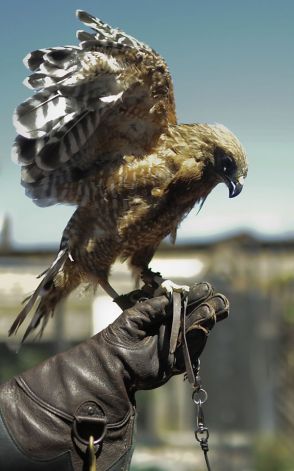Conservationists see rat in Peet's deal
Carolyn Said
Updated 08:29 p.m., Thursday, August 2, 2012

Red shouldered hawk, Phoenix, is photographed at WildCare in San Rafael, Calif.
Photo: Yue Wu, The Chronicle / SF
Wildlife lovers are brewing up a public relations campaign targeting Peet's Coffee & Tea, on the grounds that its proposed new owner has close ties to the maker of D-Con, a potent rat poison that can get in the food chain and kill or sicken other species. The Emeryville company that pioneered fresh-roasted coffee and its potential buyer say the activists are overstating the connection.
"Peet's has committed to be a progressive, socially responsible company," said Lisa Owens Viana, co-founder of Raptors Are The Solution, a coalition of environmental groups and individuals opposed to anticoagulant rodenticides, which cause rats and mice to hemorrhage to death. She terms these poisons "the next DDT," because hawks, owls, foxes, bobcats, raccoons and other animals feed on the dying rodents and themselves become ill, and because children and pets sometimes find and ingest the poison.
RATS launched a campaign asking Peet's to reconsider the billion-dollar deal in which German holding company Joh. A. Benckiser would acquire it within the next three months.
JAB has a 10 percent stake and a seat on the board of Great Britain's Reckitt Benckiser, which manufactures D-Con, the leading brand of rat poison. Although the U.S. EPA banned such anticoagulants for consumer sale starting last year, Reckitt Benckiser and two other companies are still selling them while they pursue legal challenges to the ban. Several Bay Area cities, including San Francisco, Richmond, Berkeley and Albany, ask stores to voluntarily pull anticoagulants from their shelves.
Confusion over ties
"The people voicing concerns about this transaction are causing confusion about the fact that Peet's is not being acquired by Reckitt Benckiser," Peet's said in a statement. "Peet's has a long history of supporting the communities in which we operate, socially, economically and environmentally. While we are not experts on this issue, we have faith in the U.S. EPA's position. We respectfully request those with concerns to recognize Peet's has no relationship whatsoever with Reckitt Benckiser and to take up their concerns directly with that company."
JAB, the company in contract to buy Peet's, said it doesn't meddle in Reckitt Benckiser's business. The giant Reckitt Benckiser makes hundreds of household products, including Lysol, Clearasil, Woolite, Mop & Glo and Easy Off.
JAB and Reckitt Benckiser both trace their history to Johann Benckiser, a 19th century German chemicals manufacturer. JAB is controlled by three senior partners, one of whom sits on Reckitt Benckiser's board and another of whom served as Reckitt Benckiser's CEO from 1999 to 2011.
"JAB is a 10 percent shareholder in Reckitt Benckiser and has a seat on the company's board," spokesman Chuck Burgess said in a statement. "As a matter of policy and practice, JAB does not get involved in operational decisions or the running of the company, a policy and practice it plans to continue at Peet's Coffee."
But environmentalists say the links are strong enough to raise concern.
"I grew up with Peet's and everything else tastes like swill to me," said Allen Fish, director of the Golden Gate Raptor Observatory, which tracks the annual migration of tens of thousands of birds of prey in 19 different species as they pass over the Marin Headlands. "But it is about to get into bed with someone (involved in) unbelievably horrible stuff being sold."
Bleeding to death
Once rats or mice eat an anticoagulant, they usually take several days to bleed to death, during which they desperately seek water and are more lethargic than usual, he said. "What better bait for hawks, owls, foxes, bobcats, or dogs?" he said. "There is no question how incredibly insidious this stuff is."
WildCare, a wildlife rehabilitation and environmental education nonprofit in San Rafael, got funding to test for rat poison in the sick and injured animals it sees. Of all carnivores and scavengers brought in over the past two years, 65.5 percent tested positive for anticoagulants, said Kelle Kacmarcik, wildlife solutions manager. "That was quite a bit more than we expected," she said.
What should consumers do for rodent control? "Snap traps are considered much more humane," she said. "They don't affect nontarget animals."
The name of Owens Viani's group - Raptors Are The Solution - encapsulates another method. "We encourage people to install barn owl boxes; they can consume thousands of rats and mice a year," Kacmarcik said.
Peet's cachet as a premium coffee brand may be luring other suitors. Starbucks, JM Smucker Co. (maker of Folgers coffee) and Kraft Foods (maker of Maxwell House and Yuban coffee) are all possible contenders to buy Peet's, Bloomberg News reported last week.
Carolyn Said is a San Francisco Chronicle staff writer. E-mail: csaid@sfchronicle.com
